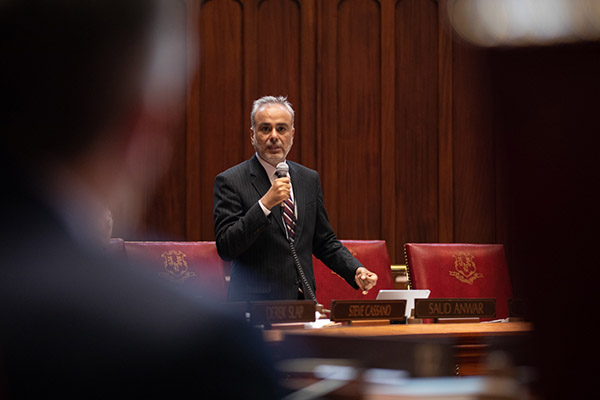Senator Anwar Proudly Votes To Create Statewide Paid Family And Medical Leave Program

HARTFORD, CT – Today, State Senator Saud Anwar (D-South Windsor) proudly voted for legislation creating a statewide paid family and medical leave program. Connecticut residents would gain access to benefits allowing them to take time off work to care for a newborn child, their personal illness or a family member’s serious illness under the new bill.
“Welcoming a new member of the family is a life-changing experience. Dealing with serious illness in one’s family can be, too. Under the stress of these situations, an individual returning to work prematurely can negatively impact their family,” said Sen. Anwar. “The majority of the developed world has some form of paid leave program in place, so we know the concept is viable. This is a real opportunity for our state to become a national leader and join our neighbors who have already implemented similar programs. I’m thankful that my colleagues worked so hard to help us bring a better tomorrow in Connecticut.”
Paid family and medical leave in Connecticut comes as the state, and several others across the United States, work to match what is otherwise a global custom. The United States is the only nation of the 41 in the Organisation for Economic Co-operation and Development and the European Union that does not provide any paid leave for new parents, and the United Nations’ International Labor Organization indicates 183 of 185 countries surveyed provide paid maternity leave; only the United States and Papau New Guinea do not.
Additionally, the legislation aims to support a changing family and household dynamic in the United States. In the last 45 years, the number of households with both parents working full time increased by 15 percent, and the number of two-parent households where the mother is not employed fell by 20 percent in that time. Connecticut joins Massachusetts, New York, New Jersey, Rhode Island, California, Washington and the District of Columbia in implementing these new programs.
Sustainable Funding
In Connecticut, personal disability leave and family care leave will be funded solely by employees. The program will be funded by a withholding rate of 0.5 percent, or one-half of one percent, on earnings up to the Social Security wage base. This is similar to other programs in other states. California funds its program with a 1 percent withholding rate on workers’ first $118,371 in wages; Rhode Island funds its with the first 1.1 percent of a worker’s first $71,000 in wages.
Who Benefits
Under the paid family and medical leave program, employees in the state will be eligible for 12 weeks of paid leave to care for a new child, a family member with a serious health condition, or to care for their own serious health condition. Additionally, employees can claim leave if they meet qualifying standards when an employee is on active duty, or if they are to serve as organ or bone marrow donors. Connecticut would be the first state to allow paid leave for such a donation.
Under the legislation, “family member” refers to a child, parent, spouse, domestic partner, grandparent, grandchild or an individual related by blood. It also refers to someone whose “close association to an employee is equivalent of a family relationship.”
Employee Coverage
Beginning on Jan. 1, 2022, the weekly benefit Connecticut employees can receive is 95 percent of 40 times the minimum wage and 60 percent on earnings above the minimum wage. The maximum benefit cannot exceed 60 times the minimum wage, meaning the maximum benefit will be $780 in 2022 when the minimum wage is $13, $840 when the minimum wage increases to $14 later that year, and $900 in 2023 when the minimum wage increases to $15.
These benefits are similar to other states, which implemented maximum benefits ranging from $850 to $1,252.
Paid leave in Connecticut will apply to private sector employers with at least one employee, while self-employed and sole-proprietor employees can opt-in. Non-union state and local government employees are also covered, while unionized workers can collectively bargain to become covered. This is similar to paid leave programs in California, Rhode Island, Massachusetts and Washington.
The bill will now go to the House.
Share this page:
